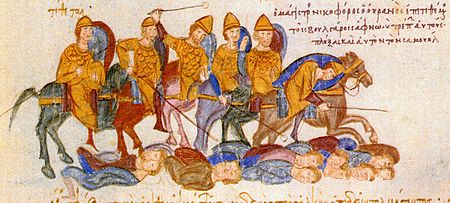Defeat and attack at Kleidon
 On July 29 a very long time ago as we now reckon these matters, in 1014, Byzantine emperor Basil II crushed a Bulgarian army at the Battle of Kleidon. It would be just one more dang thing in the depressingly long list of things that can’t end well. The entire concept of a cycle of Byzantine–Bulgarian wars, I mean. Except for one curious grimly almost uplifting note to this episode that deserves discussion.
On July 29 a very long time ago as we now reckon these matters, in 1014, Byzantine emperor Basil II crushed a Bulgarian army at the Battle of Kleidon. It would be just one more dang thing in the depressingly long list of things that can’t end well. The entire concept of a cycle of Byzantine–Bulgarian wars, I mean. Except for one curious grimly almost uplifting note to this episode that deserves discussion.
After winning the battle the emperor, possibly in a fit of rage or possibly just because he was a cruel and evil man, had 15,000 Bulgarian prisoners of war blinded, with the exception of every 100th man who was left with one eye to lead the others home. That’s not the noteworthy episode, though. It’s just more of our all-too-typical savagery that makes you wonder who coined the word “humane” and why.
Here’s the thing that’s almost uplifting. When the blinded men returned home, Tsar Samuil of Bulgaria evidently suffered a heart attack that led to his death within months. And I wonder why more leaders are not similarly afflicted personally by the misery that results from their decisions.
I’m not blaming Samuil, mind you. He is widely remembered as a hero in Bulgaria and apparently with reason, though mostly for his efforts to defend its independence (which collapsed ignominiously amid intrigue and murder four years after he died) because war kept him too busy to have much of a domestic record. It was an unequal struggle in which he did a great deal better than one could expect before finally succumbing. And while I value Byzantium as a long-standing barrier to Ottoman expansion into Europe I don’t have much good to say about its government otherwise. I think Samuil was right to fight even knowing that it exposed his men to injury, death and even deliberate mutilation. (And for what it’s worth, he had personally suffered a crippling injury in an earlier battle, in 996.)
So what I really want to know is why Basil II didn’t die of remorse at what he had done, instead of strutting about proud of his new nickname “Bulgar-slayer”. I’m all for understanding that war is hell. But we wouldn’t be safer, or better off morally, if good men and women collapsed in horrified remorse at the savagery and loss of war or even shrank from contemplating it, while bad men and women reveled in it. Or more exactly, we aren’t better off because they do, as is so often the case.
Still, the fact that Samuil keeled over in shock at the sight of his mutilated troops even though he was right to send them into battle speaks well of his character. That’s the almost uplifting part. The fact that Basil didn’t, and rolled over Bulgaria with a smirk in the aftermath, is the grim part. And regrettably it’s also the familiar one.